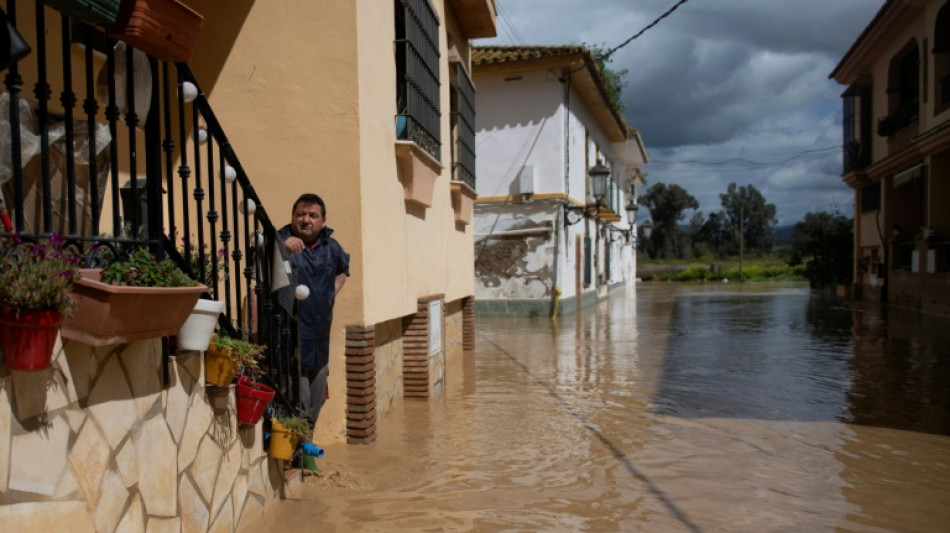
-
 German broadcaster recalls correspondent over AI-generated images
German broadcaster recalls correspondent over AI-generated images
-
US Supreme Court strikes down swath of Trump global tariffs

-
 England's Itoje says managing 'emotional turmoil' key to 100 cap landmark
England's Itoje says managing 'emotional turmoil' key to 100 cap landmark
-
Trump says weighing strike on Iran as Tehran says draft deal coming soon

-
 Tudor is '100 percent' certain of saving Spurs from relegation
Tudor is '100 percent' certain of saving Spurs from relegation
-
Azam dropped for scoring too slowly, says Pakistan coach Hesson

-
 Stocks volatile after soft US growth data, court ruling against tariffs
Stocks volatile after soft US growth data, court ruling against tariffs
-
Italy bring back Capuozzo for France Six Nations trip

-
 From Malinin's collapse to Liu's triumph: Top Olympic figure skating moments
From Malinin's collapse to Liu's triumph: Top Olympic figure skating moments
-
Arteta urges Arsenal to 'write own destiny' after title wobble

-
 Ukraine Paralympics team to boycott opening ceremony over Russian flag decision
Ukraine Paralympics team to boycott opening ceremony over Russian flag decision
-
Wales captain Lake wants fans to bring 'noise' against Scotland

-
 Skier Vonn's Italian hospital a hotbed of men, sister says
Skier Vonn's Italian hospital a hotbed of men, sister says
-
India target S.Africa top order, Abhishek to come good: bowling coach

-
 Carrick praises Man Utd 'diversity' after Ratcliffe's immigrant rant
Carrick praises Man Utd 'diversity' after Ratcliffe's immigrant rant
-
I never thought it would be hit, says 'Scream' creator 30 years later

-
 AI summit statement delayed to 'maximise' signatories: India
AI summit statement delayed to 'maximise' signatories: India
-
Barcelona's Sagrada Familia basilica hits peak height

-
 Milan sprints to second straight UAE stage win as Tiberi keeps lead
Milan sprints to second straight UAE stage win as Tiberi keeps lead
-
US GDP growth misses expectations as Trump blames shutdown

-
 Benfica investigate video of fans' monkey gestures
Benfica investigate video of fans' monkey gestures
-
French minister pledges tight security at rally for killed activist

-
 Guardiola 'couldn't care less' about Arsenal stumble in title race
Guardiola 'couldn't care less' about Arsenal stumble in title race
-
UK police search property as royals reel from Andrew's arrest

-
 Germany's Merz to visit China next week
Germany's Merz to visit China next week
-
Kompany says Mourinho made 'huge mistake' in Vinicius racism row

-
 X appeals EU's 120-mn-euro fine over digital content violations
X appeals EU's 120-mn-euro fine over digital content violations
-
Galthie recalls hulking locks Flament, Meafou for Italy

-
 Turkey, Saudi sign major solar power deal
Turkey, Saudi sign major solar power deal
-
US Olympic freeskier Hess embraces 'loser' tag after Trump blast

-
 European stocks rebound, oil prices ease after US-Iran volatility
European stocks rebound, oil prices ease after US-Iran volatility
-
'Alpha male' AI world shuts out women: computing prof Hall

-
 New Zealand freestyle skier Ives in hard Olympic crash
New Zealand freestyle skier Ives in hard Olympic crash
-
New Zealand must adapt quickly to Sri Lanka wickets: Chapman

-
 Thai activist's jail term for royal insult extended to 30 years
Thai activist's jail term for royal insult extended to 30 years
-
Families of Duterte's drug war victims eye Hague hearing with hope

-
 India chases 'DeepSeek moment' with homegrown AI
India chases 'DeepSeek moment' with homegrown AI
-
UN touts panel for 'human control' of AI at global summit

-
 Ukraine Paralympics team to boycott Opening Ceremony over Russian flag decision: statement
Ukraine Paralympics team to boycott Opening Ceremony over Russian flag decision: statement
-
UK monarchy reels from Andrew's stunning arrest

-
 Somaliland, where Muslims love Israel
Somaliland, where Muslims love Israel
-
Florida airport to be renamed after US President Donald Trump

-
 Fans flock to Japan zoo to see viral baby monkey Punch
Fans flock to Japan zoo to see viral baby monkey Punch
-
Stocks mixed, oil rises after Trump Iran threat

-
 Outspoken Laos lawmaker's election exit sparks rare dissent
Outspoken Laos lawmaker's election exit sparks rare dissent
-
Kim Jong Un vows to boost living standards as he opens rare congress

-
 Shepherd hat-trick to Samra ton: Five top T20 World Cup performances so far
Shepherd hat-trick to Samra ton: Five top T20 World Cup performances so far
-
Zimbabwe surprise as T20 World Cup Super Eights begin without Australia

-
 Victorious Takaichi promises 'strong and prosperous' Japan
Victorious Takaichi promises 'strong and prosperous' Japan
-
Ex-South Korea leader apologises for martial law crisis


Global temperatures at near historic highs in March: EU monitor
Global temperatures hovered at historic highs in March, Europe's climate monitor said on Tuesday, prolonging an extraordinary heat streak that has tested scientific expectations.
In Europe, it was the hottest March ever recorded by a significant margin, said the Copernicus Climate Change Service, driving rainfall extremes across a continent warming faster than any other.
The world meanwhile saw the second-hottest March in the Copernicus dataset, sustaining a near-unbroken spell of record or near-record-breaking temperatures that has persisted since July 2023.
Since then, virtually every month has been at least 1.5 degrees Celsius (2.7 degrees Fahrenheit) hotter than it was before the industrial revolution when humanity began burning massive amounts of coal, oil and gas.
March was 1.6C (2.9F) above pre-industrial times, prolonging an anomaly so extreme that scientists are still trying to fully explain it.
"That we're still at 1.6C above preindustrial is indeed remarkable," said Friederike Otto of the Grantham Institute for Climate Change and the Environment at Imperial College London.
"We're very firmly in the grip of human-caused climate change," she told AFP.
- Contrasting extremes -
Scientists warn that every fraction of a degree of global warming increases the intensity and frequency of extreme weather events such as heatwaves, heavy rainfall and droughts.
Climate change is not just about rising temperatures but the knock-on effect of all that extra heat being trapped in the atmosphere and seas by greenhouse gases like carbon dioxide and methane.
Warmer seas mean higher evaporation and greater moisture in the atmosphere, causing heavier deluges and feeding energy into cyclones, but also affecting global rainfall patterns.
March in Europe was 0.26C (0.47F) above the previous hottest record for the month set in 2014, Copernicus said.
It was also "a month with contrasting rainfall extremes" across the continent, said Samantha Burgess of the European Centre for Medium-Range Weather Forecasts, which runs the Copernicus climate monitor.
Some parts of Europe experienced their "driest March on record and others their wettest" for about half a century, Burgess said.
Elsewhere in March, scientists said that climate change intensified an extreme heatwave across Central Asia and fuelled conditions for extreme rainfall which killed 16 people in Argentina.
- Persistent heat -
The spectacular surge in global heat pushed 2023 and then 2024 to become the hottest years on record.
Last year was also the first full calendar year to exceed 1.5C: the safer warming limit agreed by most nations under the Paris climate accord.
This represented a temporary, not permanent breach, of this longer-term target, but scientists have warned that the goal of keeping temperatures below that threshold is slipping further out of reach.
Scientists had expected that the extraordinary heat spell would subside after a warming El Nino event peaked in early 2024, and conditions gradually shifted to a cooling La Nina phase.
But global temperatures have remained stubbornly high, sparking debate among scientists about what other factors could be driving warming to the top end of expectations.
The European Union monitor uses billions of measurements from satellites, ships, aircraft and weather stations to aid its climate calculations.
Its records go back to 1940, but other sources of climate data -- such as ice cores, tree rings and coral skeletons -- allow scientists to expand their conclusions using evidence from much further in the past.
Scientists say the current period is likely the warmest the Earth has been for the last 125,000 years.
S.F.Warren--AMWN

